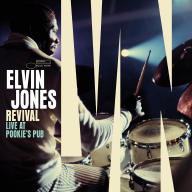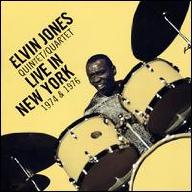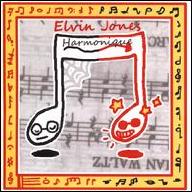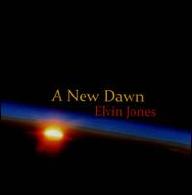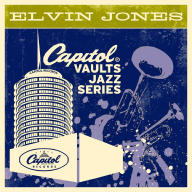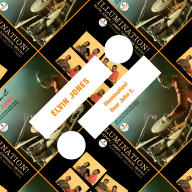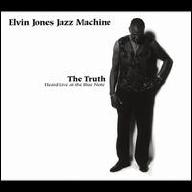Born in 1927 in Pontiac, Michigan, Jones grew up in a remarkable musical family, the younger brother of Hank and Thad Jones. Inspired in part by seeing circus parades, he started playing drums at a young age and was a member of his high school marching band. After spending time in the Army (1946-1949), he was a part of the very fertile Detroit jazz scene of the early '50s. He moved to New York in 1955, worked with Teddy Charles and the Bud Powell Trio, and recorded with Miles Davis on 1955's Blue Moods. He also appeared on Sonny Rollins' famous 1957 A Night at the Village Vanguard, Vol. 1. There were also stints with J.J. Johnson, Donald Byrd, Tyree Glenn, and Harry Sweets Edison.
By 1962, Jones had become an important member of John Coltrane's classic quartet with pianist McCoy Tyner and bassist Jimmy Garrison. Marked by a deep creative and familial bond, the quartet embraced an innovative mix of Eastern musical ideas, including pentatonic scales, flowing modal structures, and dynamic polyrhythms, all of which evoked Coltrane's deep spiritual leanings. Jones' powerful, combustible, free-flowing style (which combined a hard swing with West African polyrhythms and elements of avant-garde free jazz) was akin to Coltrane's own "sheets of sound" and helped push the saxophonist to remarkable heights, resulting in such landmark recordings as 1961's Africa/Brass, 1961's My Favorite Things, 1961's Olé Coltrane, 1962's Coltrane, 1966's Ascension, and 1965's monumental A Love Supreme.
It was also during the early '60s that the drummer began recording on his own, often with his brothers as on 1962's Elvin!. Illumination arrived the following year and featured several of Jones' Coltrane bandmates, including Garrison and Tyner. Around the time Coltrane added Rashied Ali to his band in late 1965 as second drummer, Jones parted ways with the ensemble. He went on a European tour with the Duke Ellington Orchestra and increasingly led his own projects, as on 1966's Midnight Walk on Atlantic and 1967's Heavy Sounds. Along with his solo work, Jones remained prolific as a sideman, recording with luminaries like Freddie Hubbard, Andrew Hill, and Larry Young, among others. He appeared on a slew of classic jazz albums, including Wayne Shorter's Juju, McCoy Tyner's The Real McCoy, and Joe Henderson's Inner Urge.
The drummer's work began to take on vital new sonic shades during this period with the addition of saxophonist and multi-instrumentalist Joe Farrell to his ensemble. Together with bassist Garrison, they recorded Puttin' It Together and The Ultimate in 1968 for Blue Note. Jones soon revamped the group, bringing on board saxophonist George Coleman, bassist Wilbur Little, and conguero Candido for 1969's Poly-Currents and then adding Frank Foster for 1970's Coalition. It was also during this period that he met and married his second wife, classical pianist Keiko Okuya Jones, who would become both a strong creative and business partner for the rest of his life.
He recorded regularly for Blue Note throughout the 1970's, leading a series of bands that showcased his frenetic, intelligent, and deeply passionate approach to modal post-bop. 1971's Genesis introduced the core of his '70s ensemble featuring saxophonist's Steve Grossman and Dave Liebman with bassist Gene Perla. Merry Go-Round arrived the same year and found the group expanded with saxophonist Farrell and keyboardists Chick Corea and Jan Hammer, as well as percussionist Don Alias. Different configurations of this group would pop up throughout the decade on albums like 1972' Mr. Jones, 1972's Live at the Lighthouse, and The Prime Element. Other interesting projects came his way during the decade, including playing on poet Allen Ginsberg's album of William Blake poetry, Songs of Innocence and Experience. He also appeared as gunslinger/drummer Job Cain in director George Englund's 1971 musical western Zachariah.
In 1974, he moved to the Eastwest label for Mr. Thunder, a visceral, spiritual jazz date that introduced yet another combination of players, including saxophonist Steve Grossman, guitarist Roland Prince, bassist Milton Suggs, and percussionists Luis Agudo and Sjunne Ferger. A year later, he recorded On the Mountain, a trio album with Jan Hammer and Gene Perla for the PM label. He eventually settled at Vanguard Records, where he released a string of eclectic albums, beginning with 1975's New Agenda, a groovy, funk-influenced album featuring saxophonist Grossman, guitarist Roland Prince, and bassist Dave Williams. He also co-led 1976's Together with Oregon and returned to a more hard-swinging style with Summit Meeting, featuring veteran stars like James Moody and Clark Terry. It was also during the late-'70s that he began leading groups under the title of the Elvin Jones Jazz Machine, a moniker he first introduced on 1978's Remembrance. Although the line-ups occasionally changed, the core Jazz Machine members often included saxophonists Frank Foster and Pat LaBarbera, guitarist Prince, and bassist Andy McCloud III.
Working with his Jazz Machine and under just his name, Jones stayed busy throughout the next decade. He continued his tradition of working with both younger and more established players as on 1982's Earth Jones, a fusion and post-bop date featuring saxophonist Liebman, pianist Kenny Kirkland, trumpeter Terumasa Hino, and bassist George Mraz. That same year, he reunited with several of his Coltrane associates, including McCoy Tyner, Pharoah Sanders, Jean-Paul Bourelly, and Richard Davis for Love Peace. More Jazz Machine albums arrived in the '90s, like In Europe and Youngblood, which found him working with then-young lions like Ravi Coltrane, Joshua Redman, and Nicholas Payton, among others. Released in 1994, Tribute to John Coltrane: A Love Supreme featured the drummer leading a "special quartet" with trumpeter Wynton Marsalis, pianist Marcus Roberts, and bassist Reginald Veal and exploring two of Coltrane's classic compositions.
Despite health problems, Jones remained active into the 2000s, often teaching and giving clinics at schools. In 2001, he was bestowed with an Honorary Doctorate of Music from Berklee College of Music. He also reunited with his brother, pianist Hank Jones, and bassist Richard Davis for a 2003 standards album, Autumn Leaves. Jones died from heart failure on May 18, 2004 at the age of 76. One of his final albums was a 1999 concert album, released posthumously as The Truth: Heard Live at the Blue Note and featuring his Jazz Machine with special guest saxophonist Michael Brecker. More archival albums have followed, including 2017's At Onkel Pö's Carnegie Hall Hamburg, 1981 and 2022's Revival: Live at Pookie's Pub. ~ Matt Collar, Rovi


